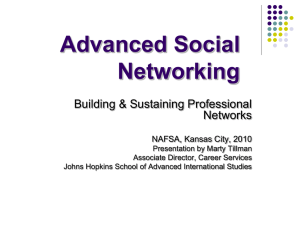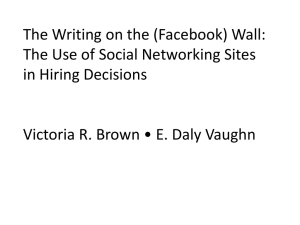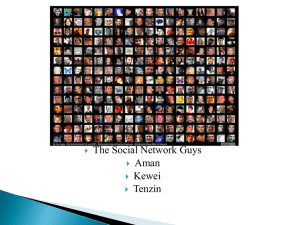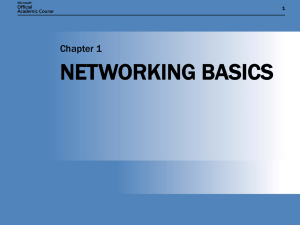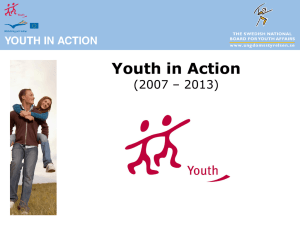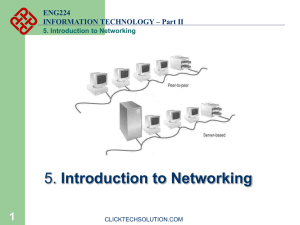*************V******************************j***k***l***m***n***o***p
advertisement
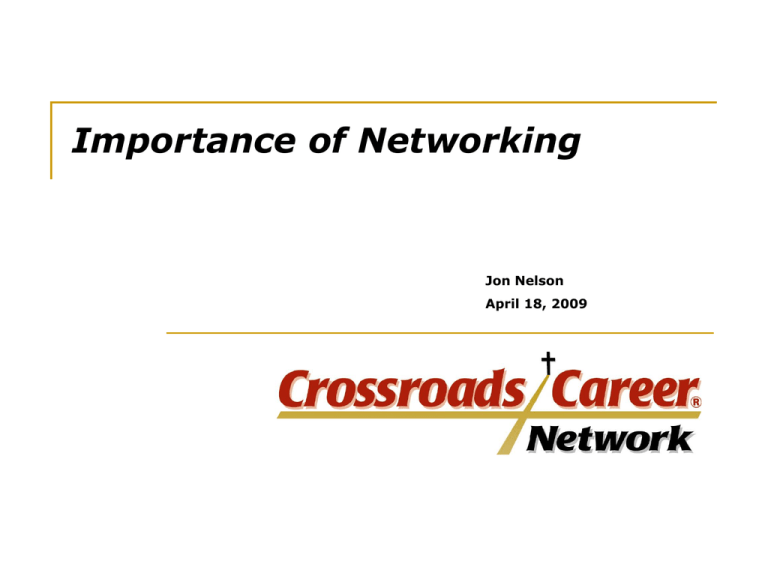
Importance of Networking Jon Nelson April 18, 2009 Agenda ■ Networking Overview ■ ■ ■ ■ ■ ■ What is Networking? Why Network? When Should I Network? Where Do I Network? How Should I Network? Who Should I Network to? ■ Mapping Your Network – Exercise! ■ 30 Second Resume – Exercise! ■ Networking Examples – Questions & Answers What Is Networking? Networking is an ACTIVE, DYNAMIC PROCESS that LINKS people into MUTUALLY BENEFICIAL RELATIONSHIPS ACTIVE – You cannot sit back and wait to be contacted or approached. You have to make it happen. DYNAMIC – People, events and information are constantly changing. You have to keep up with your industry, your business, your community. A PROCESS – Networking is a series of hierarchical actions and interactions that lead to a result, a solution, an answer MUTUALLY BENEFICIAL RELATIONSHIPS – People need to mutually profit from the interactions to make it work Why Network? 80% of people find opportunities through networking… 80% of your time should be spent networking Expand knowledge base Expand your circle of influence Lead you to people Be a resource to others Have fun!! Ten Mental Roadblocks to Networking 1. Fear of rejection – What if they say “no” 2. Fear of failure – “If I don’t get a job lead or job offer, I’ve failed” 3. Pride – “I look needy” 4. Insecure – “I’ll be bothering people… I’ve nothing to offer… I’m too shy/introverted to network” 5. Disbelief – “Networking isn’t necessary” Ten Mental Roadblocks to Networking 6. Overwhelmed – How do I get the right people to talk to me?” 7. Frustration – “I’ve been networking …but it’s taking forever” 8. Time – “I can’t find time to network or follow up” 9. Confused – I didn’t realize I could ask for that information” 10. Confidentiality – I don’t want my employer to find out” Benefits of Networking Friendship and support Advice and access to different points of view New career paths, employment, and business opportunities Referrals and introduction to professionals and quality prospects Important Information – Market shifts, etc Promotions or lateral moves within your organization Unique sales leads from sales professionals in other fields Introductions to quality vendors and other sources Advocates within related organizations and industries More Sales 4 Stages of a Job Opening Source: The Very Quick Job Search by J. Michael Farr (JIST) © Susan Whitcomb 2009 – The Christian's Career Journey – in partnership with Crossroads Career® Network When and Where to Network ■ Current/Past employment associates ■ Professional Associations ■ Customers/Clients ■ Vendors ■ Friends ■ Family ■ Alumni ■ Church ■ Neighbors ■ Charitable/Community Associations Get Ready to Network Self evaluation – to chose your career direction and focus - What do I want? - Where is my passion? - What am I looking for in my next opportunity? Specific Opportunity Evaluation - Research - What does this company do and what industry are they in? Based on my research, in what area does the company need help? Based on what I know, what is my value to the company? Who at this company would recognize my value to the organization? What do I “Bring to the Table” that is makes me stand out from the crowd, (both personally and professionally) Cover Letters, Resumes and Calling Cards - Be ready Mapping Your Inventory Colleague #1 #2 #3 #4 Supervisor Supervisee HS College Grad Exec ed Camp Present job Alumni Work Job #1 Job #2 Job #3 Family Sport Investment Reading Wine Partner #1 Partner #2 Special-interest Clubs Strategic Partners Immediate In-laws Extended Former YOU Associations Peer group Chamber Trade organization Leads group Charity Service Friends Religion Gender Politics BE WISE! Sports Sport Sport Sport (c) 2002 Effective Networking, Inc. Develop Your System to Network Categorize your list A, B, C, D. A – At least 10 people you would consider heavy hitters. Powerful people who make things happen. High visibility, high profile positions like CEO, CFO VPs, etc B – At least 10 people consisting of family, close friends. People you can have candid conversations with and can count on. C – At least 10 people you know through others, customers, vendors associations, clubs. Add your doctor, dentist, lawyer, stockbroker life insurance agent D – At least 10 people who you wouldn’t’ think at first would be people who could help you. These people are not particularly powerful, but might know the person you are looking for. These highly connected D people could be your physical therapist, dry cleaner, butcher, barber or tailor. Telephone Networking Don’ts ■ Don’t call unprepared ■ Don’t call from a cell phone ■ Don’t call while driving ■ Don’t inflate your background or abilities ■ Don’t fail to listen or interrupt ■ Don’t fail to speak ■ Don’t share too much information ■ Don’t bad mouth people or other companies ■ Don’t be afraid to ask tough questions ■ Don’t be afraid to ask for help ■ Don’t let your referral “OFF THE HOOK” Telephone Networking Do’s ■ Develop and use a phone script ■ Remember… it’s only a phone ■ Call with a positive attitude, speak with confidence ■ Carry yourself like a WINNER… you are! ■ Use voice inflections ■ Call from a quiet area ■ Keep a glass of water near by ■ Have paper and pen handy ■ Ask for ACTION! ■ Always end the conversation on a positive note Telephone Scripts – 6 Components 1. Setting the stage/ Grabbing the referral’s attention 2. Value their time 3. Setting expectations 4. Trigger a reaction 5. Generate activity 6. Close the Loop Telephone Feedback – Self Evaluation ■ What was your call objective? ■ Did you make it easy for the other person to help you? ■ Did you remember NOT to let them off the hook? ■ Did they commit to doing something for you? ■ Was the call objective satisfied? Get Ready to Network 30 Second Resume - Elevator speech – three goals 1. Clearly articulate the talents you want someone to know you possess 2. Making it easy for people to understand by using simple language 3. Having an objective. What do you want to accomplish? 30 Second Resume Strategy S – Make your infomercial Short and Succinct T – Think of it in Advance R – Remember the Results you wish to achieve A – Be Articulate in your message T – Time is of the essence – 30 seconds is optimal E – Speak with Enthusiasm and Energy G – Set a Goal to attain Y – Focus on You U in 30 Seconds, U in 2 Minutes Critical functional part of your job search Demonstrates your ability to communicate effectively. Communicates job search focus information quickly Effective use of time in networking groups. If it won’t fit on the form, don’t include it. U on 30 Seconds (aka Elevator Pitch) Name Brand / Value Proposition Label Geographic Preference Job Function 3 Target Companies Industry Connecting Comment and or Question U in 30 Seconds (aka Elevator Pitch) My Name is Kathleen Careerist I am a Human Resource Professional, exploring opportunities at the Director level in the Oil and Gas industry I’ve helped deliver double-digit decreases in turnover and implement outsourcing programs that cut cost by more than 17%. I’m interested in staying in the Dallas area, and am willing to travel as needed. My target companies are ExxonMobil, Hunt Oil, and Maguire (pause) What are your thoughts on the best way to learn more about the issues and or key people within those organizations? U in 2 Minutes, (Potential Elements of a Mini Bio) Verbal Business Card (including what you’re looking for) Number of Year’s Experience (optional) Prestigious Employers (optional) Title or Functional Area Scope of Responsibility Three point Marketing Message Value Proposition/Results Tagline (optional) Inquiry/Call to ACTION What Happened (optional) The Face to Face Networking Meeting Meeting Preparation Guide the discussion ASK for names and contacts Keep them involved in your search Give a report on previous contacts shared Benefits of Face to Face Meeting Network 30 minutes each day Nurturing Your Network Treat you network as a treasure, which needs to be nourished, preserved, and developed. Networking is a two way street – giving and receiving, you will be helping others Ways to keep in touch with your network 1. Phone calls 2. Emails send a thank you email for their help in securing your job send a small gift to those that really went all out to help 3. Send an article 4. Offer your help 5. Become a referral 6. Provide personal updates 7. Invitations to recreational activities 8. Send holiday cards Summary – Closing Comments Network as if your life depends on it… because it does! In a world where information jobs and even whole companies are transient, only your network is permanent.. Safeguard it!!! When God closes a door somewhere he always opens a window.
